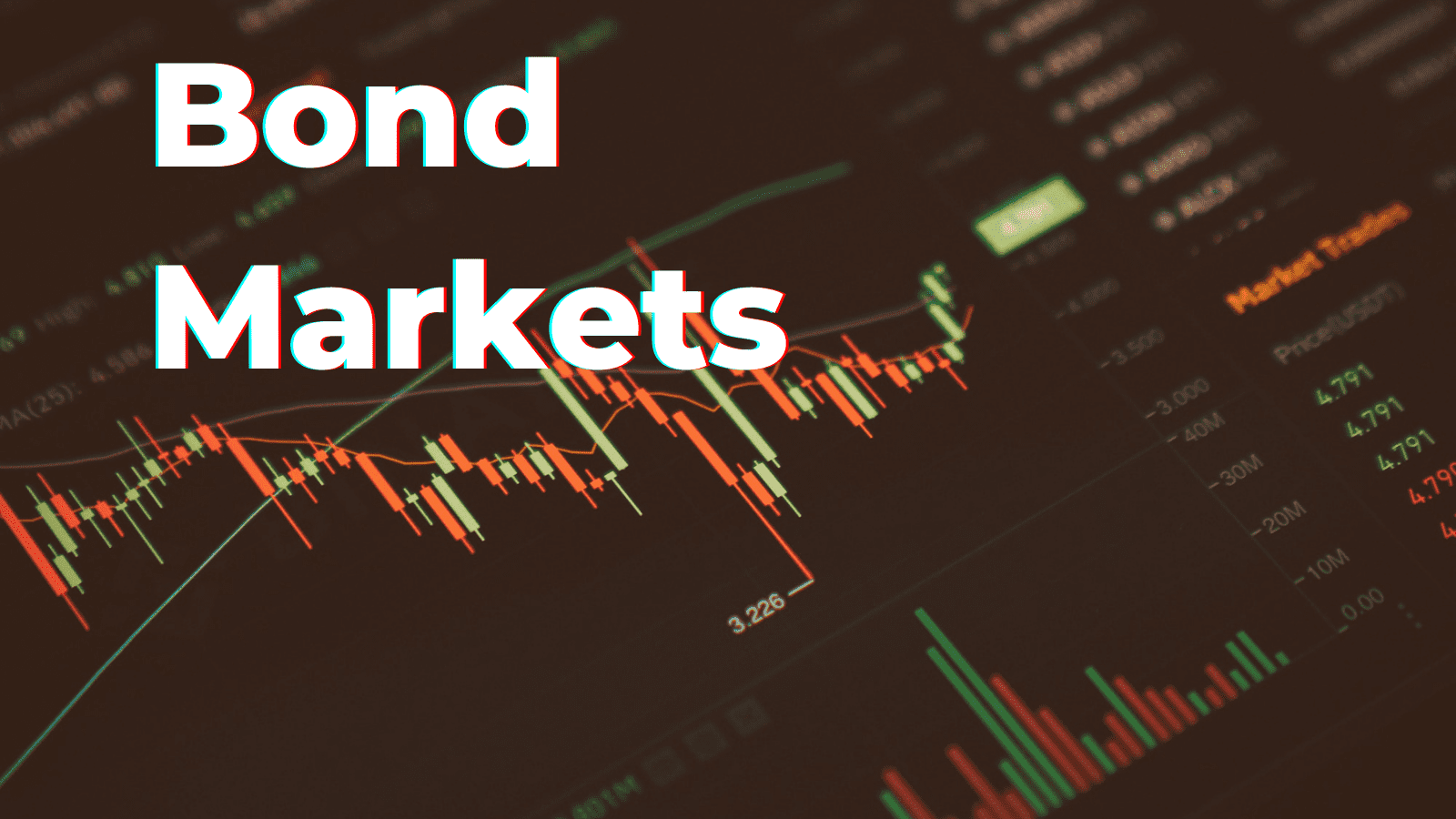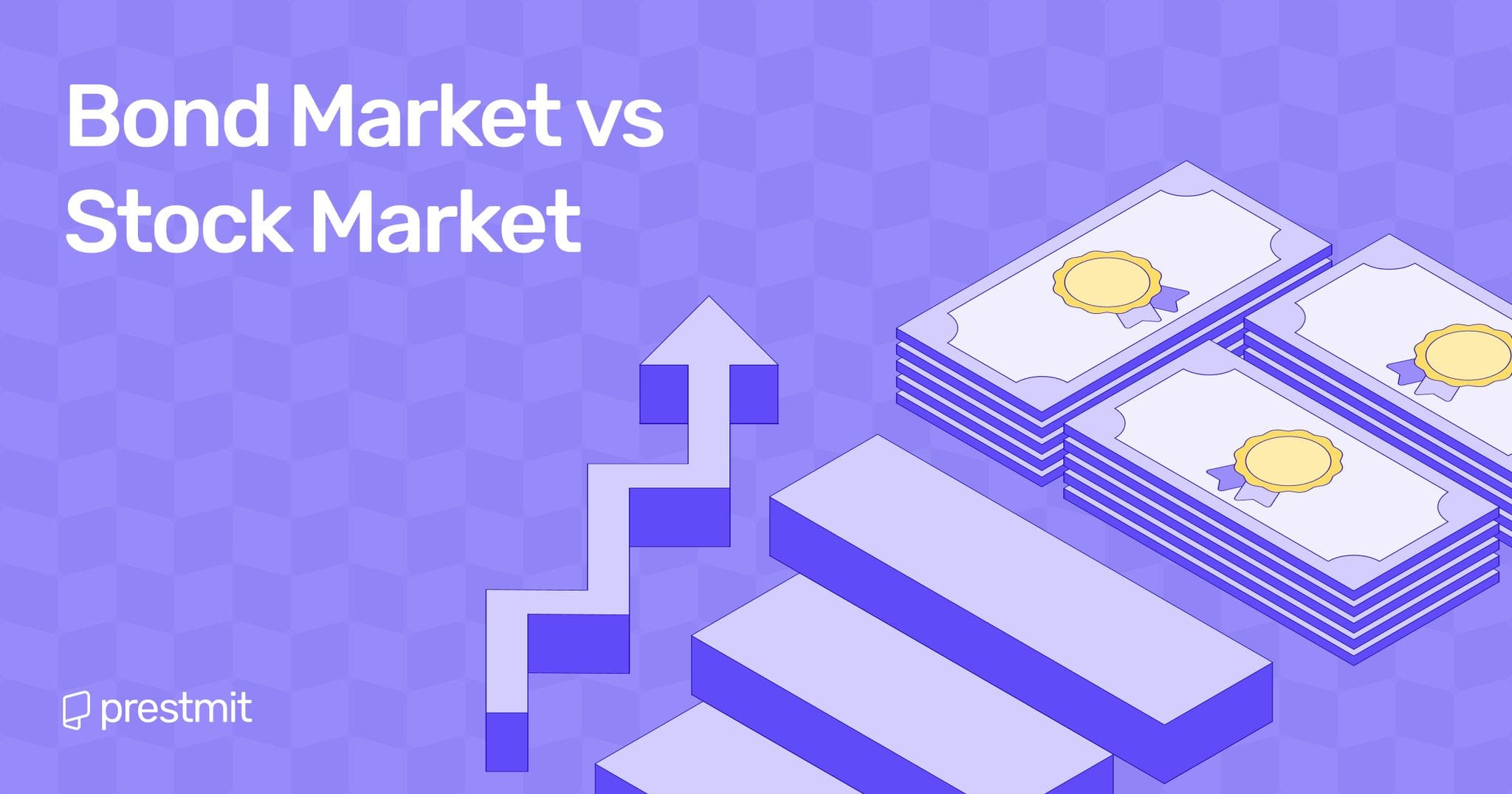Table of Contents
The major demarcation in the capital market is between the bond and share markets. The greatest investment dilemma an investor can face is choosing bonds or stocks, considering which will give the best returns.
At first glance, stocks and bonds might seem alike. But in reality, they’re very different. Stocks are a rollercoaster, while bonds are steadier. That’s why investors often run to bonds for safety when stocks wobble.
Understanding both markets, their differences, and their perks can help you invest with a steadier hand. In this article, we’ll take a closer look at the bond market vs the stock market and help you figure out which might fit your portfolio best. Let’s dive in.
What is the Bond Market?

The bond market is the financial market where investors buy and sell bonds and other debt securities. Corporate organizations and governments issue bonds when they need to raise loans from the market. The company agrees to pay an interest or coupon to the lender against the bond. As such, bonds guarantee a stream of steady income to the investor.
The bond market is free from capital volatility, so investors are always interested in adding bonds to their portfolios to diversify.
Features of the Bond Market
Some of the key features of the bond market are:
- Issuers: There is a diverse set of issuers, including governments, public sectors, private corporations, and financial institutions.
- Coupon Rate: This represents the interest rate paid to bondholders. While government bonds usually offer fixed interest rates, corporate bonds may float rates pegged to a benchmark.
- Maturity Date: Bonds have specific maturity periods ranging from short-term to medium-term and long-term.
- Interest Payments: Bondholders receive periodic interest payments based on the coupon rate and frequency stated in the bond’s terms. Some bonds may be subject to tax, while others can be tax-free bonds.
- Credit Ratings: Bonds are subject to credit ratings by rating agencies, reflecting the issuer’s creditworthiness.
What is the Stock Market?

The stock market, also known as the share market or equity market is the financial marketplace where buyers and sellers trade ownership stakes in publicly listed companies. Firms usually issue their equities in the stock market to raise equity capital from the market.
Moreover, stock prices are sensitive to market volatility, and investing in stocks involves high risks. However, stocks are highly liquid instruments, meaning they often change hands and are traded for profits.
The exchanges take place through stock exchanges in the stock market, which comprises companies, investors, traders, brokers, sub-brokers, arbitrageurs, and other players.
Features of the Stock Market
Some of the major features of the stock market are:
- Listed Companies: The stock market includes companies that have gone through an initial public offering (IPO) and are listed on the stock exchange.
- Stock Exchanges: There are several stock exchanges across the world, including the New York Stock Exchange, the Nigerian Stock Exchange, the London Stock Exchange, etc. The exchanges provide infrastructure for trading shares of the listed companies.
- Shares: Shares or stocks represent ownership in a company. When investors buy company shares, they become shareholders and have a proportional claim on the company’s assets and earnings.
- Dividends and Capital Gains: Stocks give dividends, a share of the company’s profits distributed to shareholders. Capital gains result from selling shares at a higher price than the purchase price.
Bond Market vs Stock Market: What is the Difference?
1. Bond Market vs Stock Market: Maturity Date
Bonds are debt instruments with a maturity date. However, stocks are freely traded and don’t have a maturity date. This is because stocks are issued in the primary market as IPOs and traded in the secondary market, depending on their values.
2. Bond Market vs Stock Market: Returns
Returns on bonds are lower than on stocks. However, the return on bonds is fixed, whereas dividends on stocks are a function of the company’s profit and performance. Therefore, if a company’s performance is poor in a year or it earns less profit, it can decide not to pay a dividend to shareholders.
3. Bond Market vs Stock Market: Risk
Bonds are considered less risky when it comes to valuation and return. Bondholders are considered lenders – as such, they have the first claim on the company’s asset if it goes bankrupt.
Meanwhile, stocks are high-risk as their prices are subject to market volatility. Events like market news, the economy, sector performance, and political conditions can cause stock prices to rise and fall. Therefore, the stock market is ideal for investors with a higher risk tolerance and long-term investment goals.
4. Bond Market vs Stock Market: Income Generation
The bond market provides a stable income stream through regular interest payments (coupon payments), while stocks can generate income through dividends and capital appreciation when you sell shares at a higher price.
Advantages of the Bond Market
- Steady Income: Bonds pay regular interest (coupons), giving you a predictable stream of cash, perfect for covering expenses or funding short-term goals.
- Lower Risk: High-quality government or corporate bonds are less volatile than stocks, helping protect your portfolio from big swings.
- Diversification: Adding bonds alongside stocks can balance risk and smooth out market ups and downs.
- Capital Preservation: Bonds are generally safer for preserving your principal. If you hold them to maturity, you get your original investment back.
- Tax Benefits: Some municipal bonds offer tax-free interest, depending on your region.
Advantages of the Stock Market
- Growth Potential: Stocks can grow significantly over time, helping build wealth faster than bonds.
- Dividends: Many companies share profits through dividends, adding extra cash on top of potential price gains.
- Ownership and Influence: Buying stocks makes you a part-owner of the company, with potential voting rights and a say in certain decisions.
- Liquidity: Stocks are generally easy to buy and sell, giving quicker access to your money.
- Variety and Flexibility: With thousands of companies and sectors to choose from, investors can diversify across industries, countries, and growth opportunities, tailoring their portfolio to their goals and risk tolerance.
- Inflation Hedge: Stocks can rise faster than inflation, helping protect purchasing power over the long term.
Bond Market vs Stock Market: Which is Better for You?
Choosing between bonds and stocks depends on your goals, risk tolerance, and timeline. There is no universal winner. Here’s a quick guide:
Consider Bonds if you:
- Want regular, predictable income.
- Plan to invest for 2–5 years.
- Have a low risk tolerance
- Are you saving for short- to medium-term goals, like buying a house in a few years?
- Want a steady anchor in your investment portfolio.
Consider Stocks if you:
- Can handle market ups and downs without panicking.
- Are you investing for long-term growth, like retirement 10+ years away?
- Want the chance for higher returns, even if it comes with more risk.
- Enjoy being a part-owner of companies and influencing decisions through voting rights.
Mixing Both:
Most investors don’t have to pick just one. Combining stocks and bonds can give you growth potential and stability, smoothing out the ups and downs of the market while helping reach both short- and long-term goals.
Frequently Asked Questions (FAQs) About Bond Market vs Stock Market
What Is The Risk Level In The Bond Market vs Stock Market?
The bond market generally carries lower risk than the stock market, which experiences higher risk due to market volatility and short-term fluctuations.
Which Market Is Considered Safer Between Bond Market And Stock Market?
The bond market is considered safer, especially when investing in government bonds. Meanwhile, the stock market is riskier but offers the potential for higher returns.
How Do Investors Influence Companies In Bond Market vs Stock Market?
Bondholders have limited influence on a company’s decisions, but stockholders have voting rights and can influence a company’s decisions in the stock market.
How Do Returns Differ In The Bond Market And Stock Market?
Bonds offer lower but more predictable returns through fixed interest payments, while stocks have the potential for high returns through dividends and capital gains.
Conclusion
The bond and stock markets offer unique features and benefits that make them attractive to a wide range of investors and traders. Ultimately, the choice between the bond and stock markets depends on individual financial goals, risk appetite, and investment outlook.
Therefore, it is essential to seek guidance from a financial advisor to develop a personalized investment strategy tailored to your needs at a given time.
Last updated on October 29, 2025

